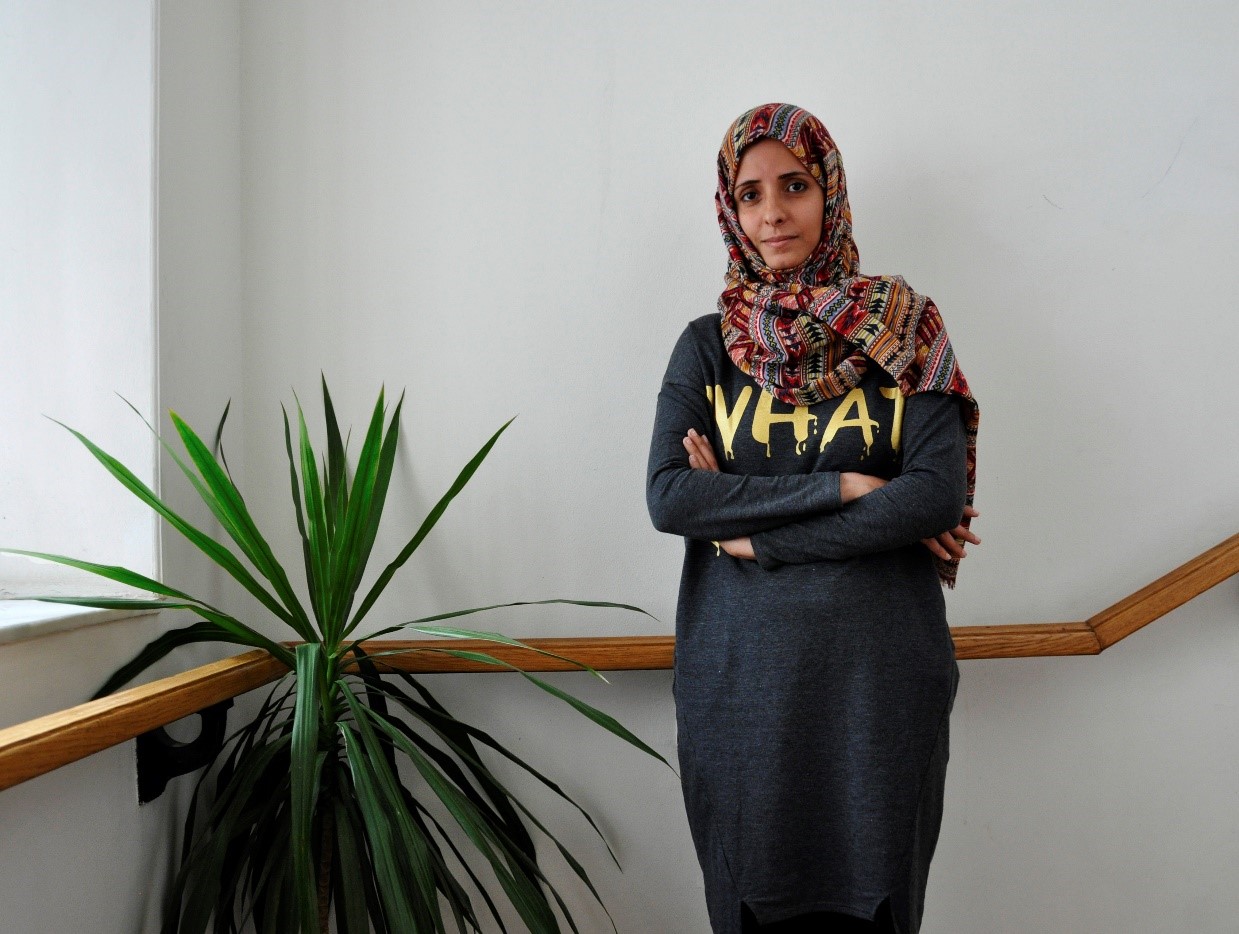In the words of Areej Jamal Al- Khawlani: “Yemeni women and girls are the ones truly paying the price of war”
Date:

Areej Jamal Al- Khawlani has worked at UN Women Yemen as a Programme Associate since 2017. Prior to joining UN Women, she was part of the Yemen Parliamentarians Against Corruption Organization (YemenPAC) and worked for the Mwatana Organization for Human Rights. In 2014, when the war in Yemen broke out she had started her Master’s degree. With insecurity across the city, the deterioration of the general situation and the departure of a number of professors, she had to interrupt her studies.
“Daily life in Yemen has become very difficult whether it is at home, university or work. Yemenis are facing many urgent issues, including the humanitarian situation. More than 22 million people need urgent assistance - people are exhausted, starving, and can no longer cope with the impact of the war.
The challenges – both personal and professional - of working under these conditions cannot be underestimated. Professionally, the dynamics of the conflict have placed many restrictions on the work of international and local organizations. This requires us to think creatively about how we can achieve our objectives to support the women and men, girls and boys of Yemen – particularly those most affected by the war. The deteriorating security situation in Sana’a also means that we sometimes have to work from home, and in addition to regular power cuts the ongoing escalation of violence causes anxiety and a lack of focus. Could you imagine that while you are working on tasks that require concentration you hear the sound of explosions and airstrikes near your home? Not only does it affect me, but it affects my family – who I need to help calm and care for while ensuring that we have sufficient food, power, and basic goods.
Traveling, even for work, is also extremely limited. Going to Cairo for a training was a long process, and the travel itself took 2 full days -including passing through more checkpoints than I can count between Sana’a to Aden before I could get on a flight.
In addition, working on women’s rights has its own specific struggles: while we support and advocate for women's participation in public life, such as in political debate, peace negotiations and decision-making, some people argue that Yemen is in crisis and it is not the right time to talk about women and their involvement – that women can play a role once there is a ceasefire and the violence ends. But we know that women have something to say on ceasefires, and we know that ceasefire agreements can and should contain gender-sensitive provisions. They can contain language that ensures that all follow-up mechanisms include women, and that sexual violence is included as a violation of that ceasefire.
UN Women responds to this by working with members of the Yemeni Women Pact (a voluntary platform of Yemeni women with diverse backgrounds which was established in 2015 with the support of UN Women) to call for their engagement in all political dialogues. We support them to meet with representatives of parties to the conflict and the Special Envoy of the UN Secretary-General for Yemen, to advocate for women’s involvement in all aspects of the peace process. We also try to facilitate informal alliances between women within political groups and members of the Pact, to convince them of the importance of their participation to encourage them to support these efforts.
As UN Women, our priorities in the country are to support the voice of Yemeni women in political dialogues and peace building processes, to ensure that the UN’s response to the crisis addresses the needs of Yemeni women and girls and, linked to this, that we can deliver immediate protection and livelihoods services to displaced and marginalized Yemenis.
Yemeni women and girls are the ones who are truly paying the price of war. They are now having to step into roles that were traditionally filled by men, because so many men have been killed or injured, forcibly disappeared or have lost their jobs. The most urgent issues include the lack of medical care, and the consequences of economic devastation. Yemeni women experience the double burden of being the family’s main provider while retaining their expected role of primary family caretaker.
The dreams of many Yemeni women and girls still did not come true, just because they are women and girls living in Yemen. I hope to see them free to act in their own best interest, live free from violence and of course, live their dreams.”
Conditions for women and girls are deteriorating rapidly as the conflict in Yemen nears its fourth year: 75% of internally displaced persons (IDP) are women and children. The threat of famine affects 8.4 million people, especially women and children; 3.3 million children and pregnant women are acutely malnourished. Women and children account for the largest number of civilian victims and an estimated 3 million women and girls are at risk of gender-based violence, with a 36 per cent rise in Gender Based Violence (GBV) incidents reported in 2017. Child marriage rates have escalated, rising from 52 per cent of Yemeni girls under the age of 18 marrying in 2016 to close to 66 per cent in 2017. Among female-headed IDP and host community households, nearly 21 per cent are headed by females below the age of 18.